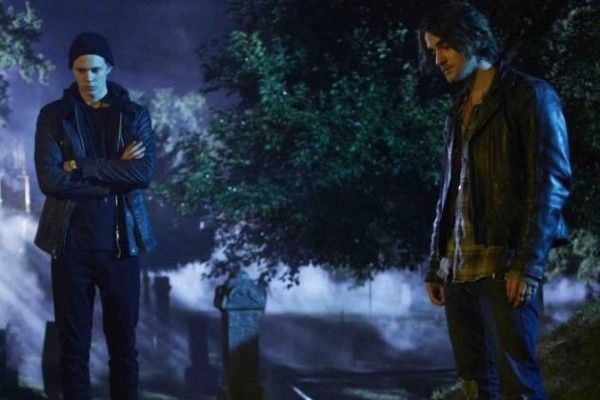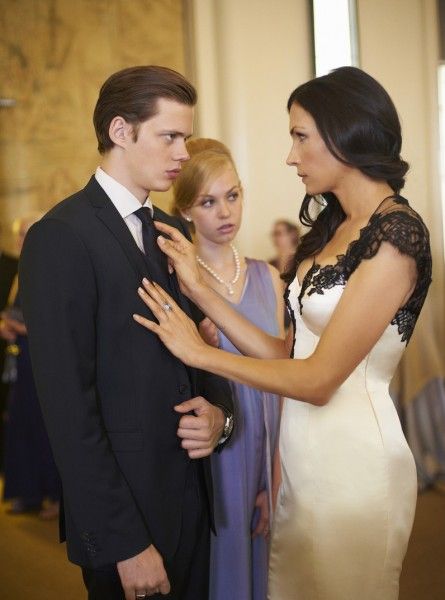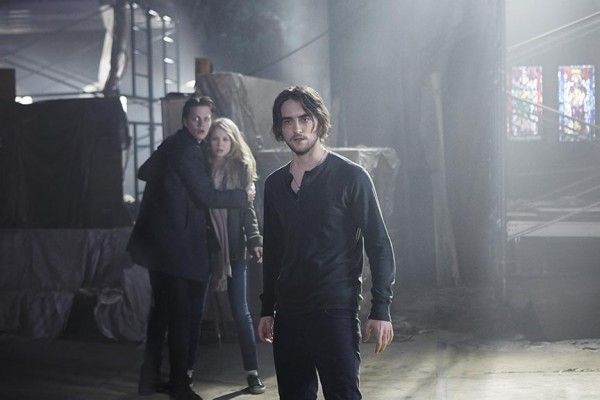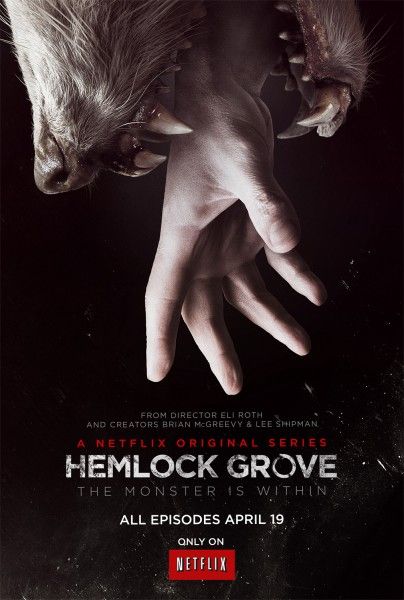Author/screenwriter Brian McGreevy grew up in Pittsburgh and attended school at the University of Texas. His book, Hemlock Grove, was first published in 2012 and was immediately snapped up for possible film development. By then, he already had a pair of screenplays in development. Hemlock Grove was eventually slated for television status: with a 13-episode season slated for release as part of Netflix’s development of original content. He currently acts as the show’s executive producer, as well as its principal screenwriter. He spoke to the press in a roundtable interview during the last few days of shooting on the set. Hit the jump to see what he had to say.
Question: How exciting was it to see your book turned into real life?
BRIAN MCGREEVY: I actually don't know that I've completely emotionally processed that, but I guess the answer is very.
Were you happy with the sets and whatever else that they put together?
MCGREEVY: You take this location… It's definitely a weird relationship where this was the set that had existed in my brain for a number of years and to find a place like this approximate to where our studio was in the city was pretty mind-blowing. All across the board, we're shooting in the greater metro area. We have some pretty stunning locations and then our art department is a pretty outstanding group of people and so our studio spaces are pretty great as well.
Were you surprised by how much creative input you've been able to have in the production process?
MCGREEVY: That was not by accident because myself and the other executive producers pursued the Netflix relationship pretty aggressively because we knew that that was the right approach. We knew that they were sympathetic to what we wanted to do.
Having written the novel and being a producer -- you're also involved in the scripting of the episodes as well?
MCGREEVY: Yes, myself and my screenwriting partner wrote over half the season just ourselves.
So what's it like taking something -- a novel is a completely different literary format -- and trying to distill it into script form? What's that process like for you?
MCGREEVY: Here it's funny. The process was the opposite of distillation. When I first started working with the other executive producers on this show, Eric Newman and Eli Roth, there was a question of whether or not to pursue it as a feature film adaptation, which would be the conventional distillation, or do it this way, which required quite a bit of expansion. That has actually been the fun part. Especially as we got further along into the casting process, figuring out the way that the characters and the ensemble evolved to go over that process because TV is a slightly more forgiving medium than the novel traditionally for focusing on ancillary characters without getting distracted. Finding ways to explore this world a bit more has actually been a great time and finding the in between moments -- there's was an original draft of the book that was 100 pages longer that for the sake of the read had to be cut, and so a lot of that stuff found its way back onto the show.
We've heard this described as a 13-hour movie. I know you described it as such in interviews. How do you approach that versus making a more traditional TV show?
MCGREEVY: Well, we definitely wanted interesting things to be happening on a regular basis, but conventional network television works according to a formula on an episode, an episode basis. When there are commercial breaks, there's a traditional four-act structure. Episodically, we didn't really have an interest in doing that, and episodically, Netflix was not in the market for that. Here the idea is that, like a novel, the thing is designed to work as a whole, but also, like a novel, if you don't have chapters with some sort of narrative propulsion and narrative benchmarks that are compelling you to go forward, there's no reason for you to go forward. I feel like we're all in the exploration phase of that now. And hopefully we figured it out.
Were there any actors that you really wanted that you got?
MCGREEVY: Yeah, most of them. Take the casting of Roman [played by Bill Skargard]. The assumption was that we were going to have to go through dozens and dozens of tapes and bring all these people in and it was going to be a nightmare to find someone who hit every register that that character needs. And then we got our first tape and the casting director was like, "This kid's cool. You should pay attention to this kid." "Okay, cool, check, done."
Following up on that, I don't think any author in the world is presumptuous enough to think a movie is going to be made of their work, but when you were creating the novel, did you have thoughts of certain types or certain actors who helped inform your characterizations?
MCGREEVY: For Olivia, not necessarily physically, but for her character I was thinking a lot about Bette Davis and Joan Crawford. The casting of Dougray [Scott] was very serendipitous because the way I'd always conceived of Norman was having this very masculine, more 1940s, Hollywood-style look like William Holden. For us, Dougray really captures that square-jawed masculinity, but also deeply hurt persona that we really needed for the character. It's a funny thing where you're casting something like this. There's always going to be an aspect of the performer that happens to coincide with who they're playing. To a certain extent, I really think it's its own cosmic law of attraction that brings everyone together.
You mention all these old-time actors and being in the house I totally see a lot of those old-time actors working in the house. Was that important to you in the look of the show?
MCGREEVY: Within the gothic tradition, setting is as much character as any character is, so the answer is yes, crucially, in the same way that the other major locations play an equally important role.
There's a lot of supernatural and horror shows on television. When you were deciding to go to series with this, were there any steps that you took in between the novel and the scripting to make sure that this stood apart from stuff like Twilight or True Blood? Or was that something you felt was inherent to the material?
MCGREEVY: We started by casting an entirely different Skarsgard. [Laughs] We honestly weren't thinking that much about the market as a whole in the same way I felt when I was writing the book. I had extremely little concern with what other people were doing. "Okay that's cool, that's what other people are doing.” It's more like a lot of people involved in this project were deeply attracted to the core of the story. It's more worrying about ourselves and our own individuality and authenticity and just assuming that it is what it is and that to change it towards the direction of something else or away from the direction of something else wasn't what we were trying to do. We were trying to do something quite specific and quite odd, and have a very specific and odd group of people who are executing it. We were just trying to do something special.
Can you tell us about the visual sensibility of the show? What was your approach to the look? What style did you want to have?
MCGREEVY: We wanted something that was lush, something that had a slightly more colorful palette than you're seeing traditionally within the genre. We wanted to skew away from that monochromatic look. To a certain extent, we wanted there to be echoes of old Hollywood in what we're doing and to be very classical in the way that we were thinking about the visuals to both contrast with, but also bring the spice out of the operatic nature of the material.
If the story continues, do you see it sticking pretty close to the source material since you already have a second book written and an outline for the third? Or do you see it going a different direction?
MCGREEVY: There ends up being a kind of snowball effect when you're doing an adaptation. I've worked in the form of adaptation before, just not with regards to my own work. You want to respect the source material, but fidelity is not necessarily your friend.
Can you talk a little bit about pushing the envelope with the gore for this? Because we've heard this is very gory, which you wouldn't be able to do on a mainstream network.
MCGREEVY: I don't think we're actually that gory. I would say we're much less gory than Walking Dead. I think that we're really pushing the envelope in terms of content because there are some creative avenues that Netflix are permitting us to go that you're not going to get somewhere else. One of the reasons why Eli was so attracted to this show is that he wanted to be perceived as something more than just a gore guy. Granted, we have gore. I'm not saying that we don't. Some of it's pretty gross and all, but that wasn't really, we weren't really trying to do a strictly splatter thing. In terms of psychologically traumatic, we have that in spades.
Writing is a pretty solitary thing. What's the collaborative aspect of working on a show like this?
MCGREEVY: The analogy that I've used before is that writing a novel is like building a ship in a bottle and doing something like this is like building a ship. It's an extremely complex enterprise that just exercises completely different parts of your brain. I would say that my only single qualification to be doing it is that for any question that anyone on the show would have is that I would have an answer I've been thinking about for five years.




